The Electronic Intifada 13 December 2018

Yasser al-Zaben (left) and young relatives gather olives in Burin. The family lost about 20,000 square meters to surrounding settlements and the trees that grew there were burned. “What we demand is a better life for our children than for ourselves,” al-Zaben, a civil engineer, says.
Amira Salman cannot imagine her life without olives.
“I have been working with olives for 50 years. Nothing works without the olives,” the 56-year-old said, citing a popular saying: “Lentils and oil are the foundation of every home.”
With two of her sons, she was harvesting olives in Deir Istiya, in the Nablus region of the northern occupied West Bank. In keeping with traditional arrangements, the Salmans will keep one-third of the olives they pick while the rest go to the owner of the land.
Another olive harvest season in Palestine has just passed, a period much awaited every October and November. It is an important time for the Palestinian economy. According to the United Nations Conference on Trade and Development, the olive sector comprises 15 percent of total agricultural income. The olive harvest mitigates the impact of unemployment and poverty by providing three to four million days of seasonal employment per year and by supporting 100,000 families.
Eighty percent of land cultivated with trees in the occupied West Bank and Gaza is used for olive groves, according to the UN. The olive oil they produce is largely consumed by the domestic market. Excess supply – some 4,000 tons annually on average – has been exported, mostly to Israel, though since the beginning of the second intifada in 2000, this market has dwindled and is near an all-time low.
Olive trees provide resources not only for the olive harvest, but also for soap and wood used for craft. The significance of olive trees to Palestinians is also more than its economic value, said Baha Hilo, the coordinator of the initiative To Be There – which works to bring people from around the world to Palestine for informational tours, including during the olive harvest season.
Attacks
“There is a connection between the Palestinian family and their olive trees. You see that and you hear that whenever Israeli bulldozers come and destroy olives groves. So you ask a Palestinian family: ‘How does it feel?’ And they will say: ‘It’s like butchering my family’ or ‘It feels like cutting my arm off.’ There is a biological connection between you and that olive tree that produces for you, that gives you a means of livelihood.”
The olive tree has become part of the Palestinian identity, a national symbol of resistance and of the connection to the land. Harvesting, especially close to the settlements or in areas cut off by the Israel’s wall in the West Bank, is considered part of the resistance to Israel’s occupation.
But the olive harvest has also become synonymous with attacks by Israeli settlers against pickers. These settlers routinely destroy trees and steal olives. Since 1967, when Israel occupied the West Bank, the UN estimates that some 800,000 Palestinian olive trees have been uprooted, set on fire or vandalized by settlers or been cleared for Israeli settlements, construction of the wall and other measures related to the occupation.
In areas close to Israeli settlements, Palestinians need to obtain permits from the Israeli military authorities to harvest olives. These are usually granted only for a few days.
This year was no exception when it came to attacks by settlers. So far this year, more than 7,000 olive trees have been damaged by Israeli settlers.
Settler attacks during the harvest have been reported in Turmusaya near Ramallah; Burin, Haris, al-Lubban al-Sharqiya, all in the Nablus region; as well as in Jit village and Deir al-Hatab, where settlers assaulted two Palestinians. Tel Rumeida in the Hebron area also witnessed settler violence.
The United Nations Office for the Coordination of Humanitarian Affairs also reported damage to around 700 olive trees and theft of produce in five incidents in the villages of al-Mughayyer (Ramallah), Burqa and Tell (Nablus), al-Khader (Bethlehem) and Farata village, between Nablus and Qalqiliya.
The International Women’s Peace Service, an organization of international activists based near Nablus, reported an attack by Israeli settlers against a Palestinian couple picking olives in the village of Urif on 8 November. Following the attack, the Israeli army shortened the picking period of the villagers.
Despite such constant threats of settler violence and army harassment, the olive harvest is a time of great solidarity among Palestinians and with the outside world. Every year, internationals come to help the Palestinian farmers, especially in areas near settlements. Palestinians also volunteer, such as Muhannad, 26, who is part of the Hebron-based Youth Against Settlements activist group.
“My motivation is supporting the sumud [steadfastness] and the resistance for the other families,” said Muhannad, who did not want to give his family name. “For us, it’s very important to be here as Palestinians, to help farmers staying on the land and in their houses, because we know that if we don’t come here, the settlements will expand, and then the next settlement will be my house.”
Palestinians can also count on members of their family. Every year, several generations work side by side, passing down the tradition and the love of the land.
“The olive tree in Palestine is the homeland, it’s freedom, it’s belonging. If we do not belong to the olive tree, we do not belong to Palestine,” said Yasser al-Zaben, a civil engineer from Burin. “Therefore, we are ready to leave our work, even if we make tens of thousands of dollars, just to work one day in the olive orchards.”
Anne Paq is a French freelance photographer and member of the photography collective ActiveStills.
Ahmad Al-Bazz is a multi-award winning journalist, photographer and documentary filmmaker based in Nablus, and a member of the photo collective ActiveStills.
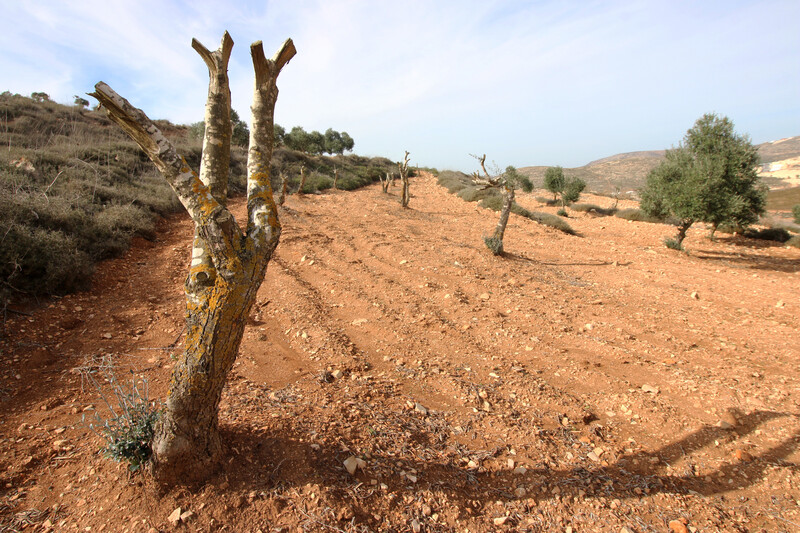
Vandalized olive trees in Turmusaya, near the Israeli settlement of Adey Ad. According to the owner, Rabah al-Araj, 165 of his olive trees were cut down on 2 October. It was not the first time.
“Every year they cut trees. Every year.” He says he was once attacked by a settler, who shot at him him while he was planting trees.
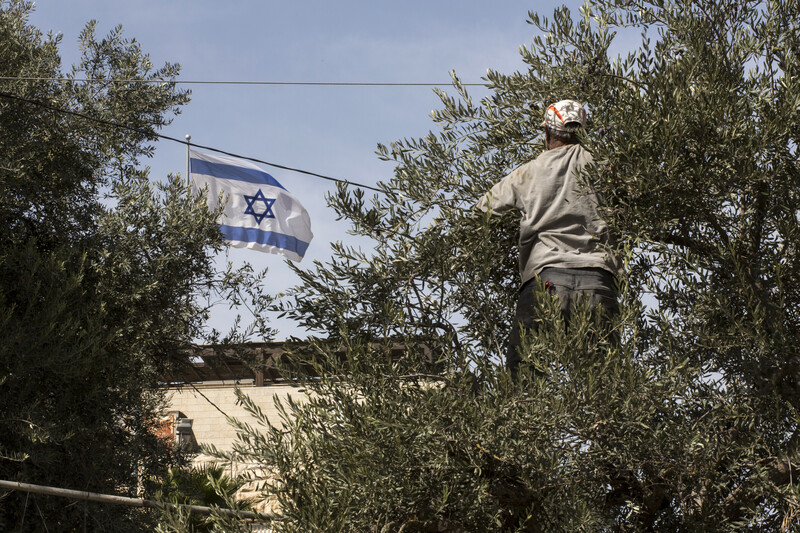
Muhammad Quneibi, 64, harvests an olive tree located just a few meters from an Israeli settlement in Tel Rumeida, Hebron. The family owns 40 trees. Settlers uprooted seven of them last year.
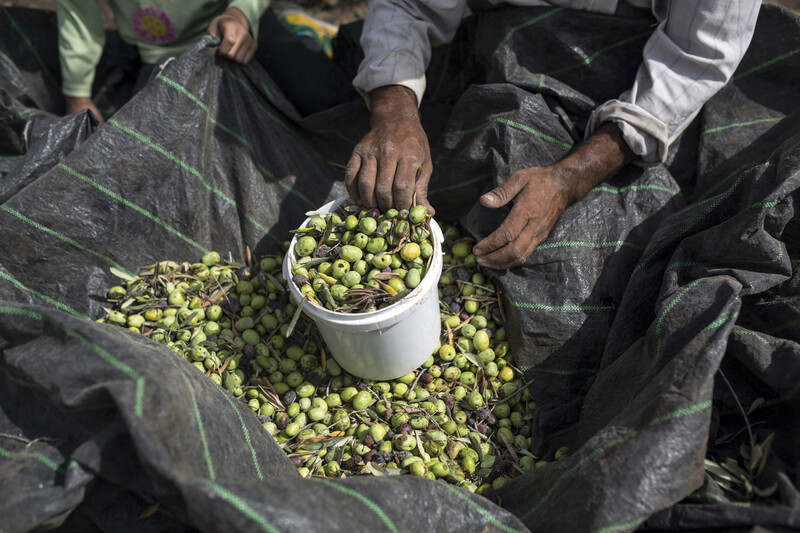
“The state of Israel wants the land,” says Baha Hilo, coordinator of To Be There, a program bringing people from all over the world to Palestine. “Even God in the state of Israel is a God that gave this land to the Israelis. When Israeli policy is about taking away your land, your presence on your land is a form of resistance.”
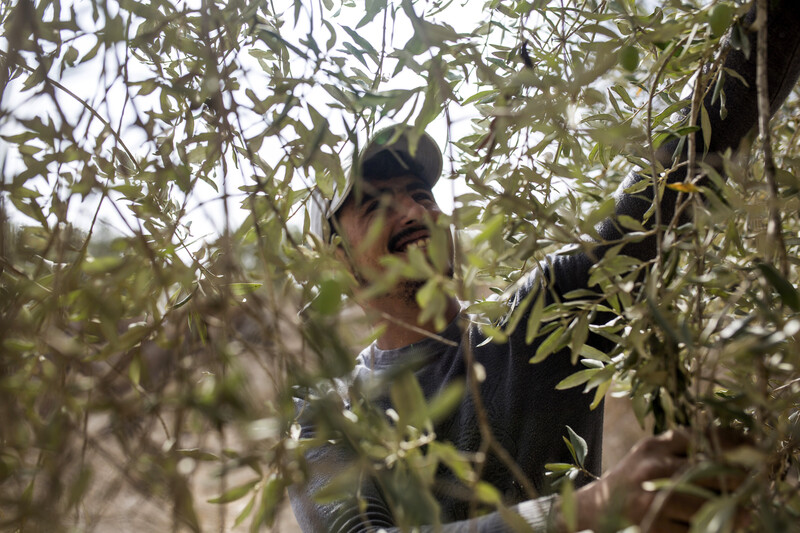
“This is part of the resistance, especially for those with lands close to the settlements. So each year, we have to do it, we should do it, we must do it. My father does it, my grandfather does it. It’s in our blood. I insist on it. It’s our identity … and also the olive oil is very delicious,” says Ibrahim Eid, 26.
Eid is a nurse in Nablus but he takes time off work to help an uncle collect the olives in the family orchard in Burin.
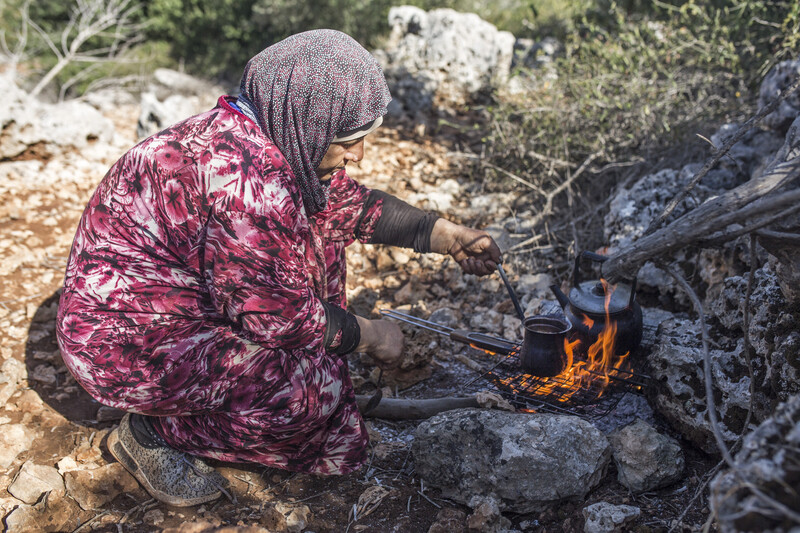
Amira Salman, 56, from Deir Istiya, prepares coffee during the harvest.
“Can you cook without oil? We don’t like imported corn oil. I don’t let it enter our home. Olive oil is healthy and delicious. I also use traditional [olive] soap from the village.”
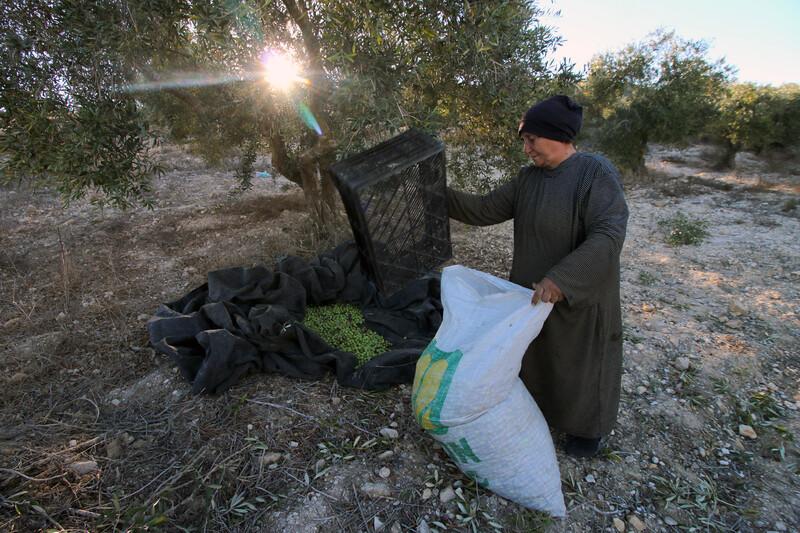
A group of international volunteers work side-by-side with Palestinian farmers near the settlement of Efrat, south of Bethlehem. Laura, from Spain, is one. She came with the To Be There program and didn’t want to give her full name for fear of not being able to return to Palestine.
“It’s the third time I’ve come. I want to collect information to show in Spain and to support Palestine. This is the right of Palestinians to cultivate. You connect to the land and history. It’s important to show solidarity with farmers, especially when they are alone with settlers next to them,” she says.
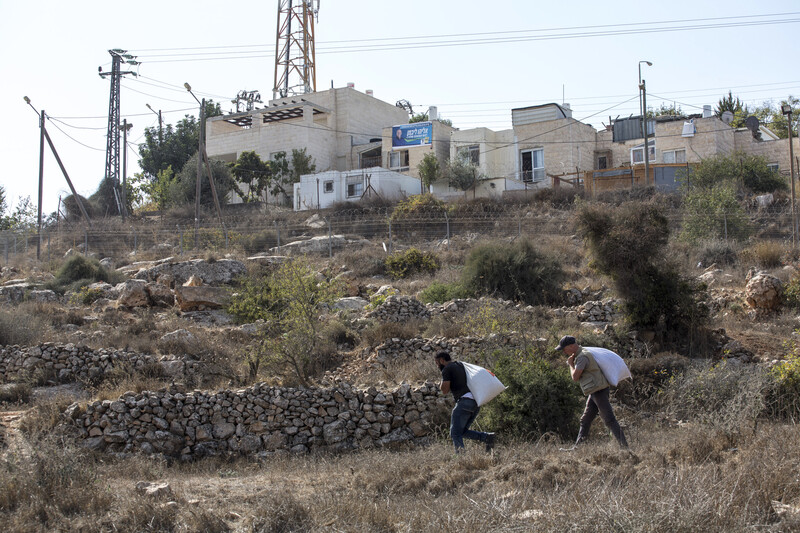
A Palestinian from the Jabari family and an international volunteer carry bags full of olives. Behind them is the Israeli settlement of Givat Ha’avot.
“This land is not from my father,” says Ayat Jabari, 33. “It has been in my family for generations. My father talked to us, to my brothers, to all of us, to keep it. We are young generations, but we feel the same. It grows in the heart. This is Palestinian, this is for us, and we will try all the time to keep this land, and do what we can to stay here. I am the owner of this land, how can I give it to others?”
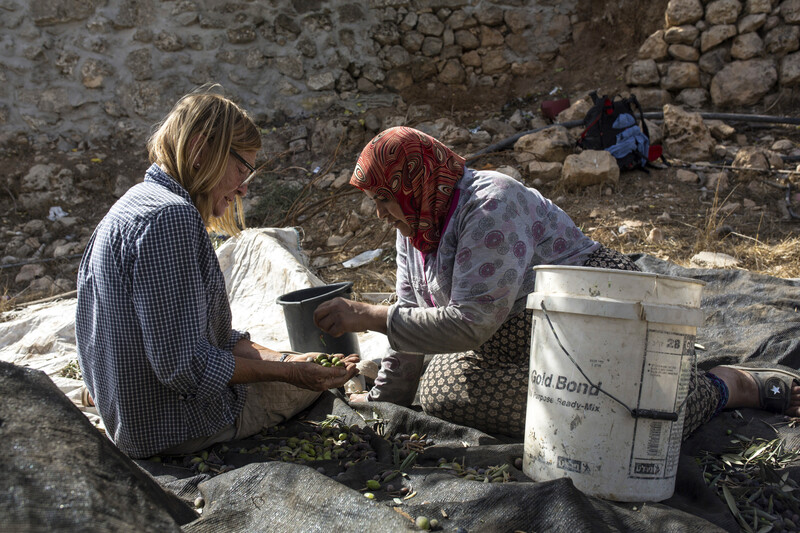
Fatma Quneibi, 45, and an international volunteer from Ireland pick olives together in Tel Rumeida, very close to the Tel Rumeida settlement.
“There is so much daily suffering here. How can people endure it? There are so many settlements and checkpoints. I did not realize the extent of the settlements before coming,” says the volunteer who, like most volunteers, does not want to give her name for fear of possible repercussions.
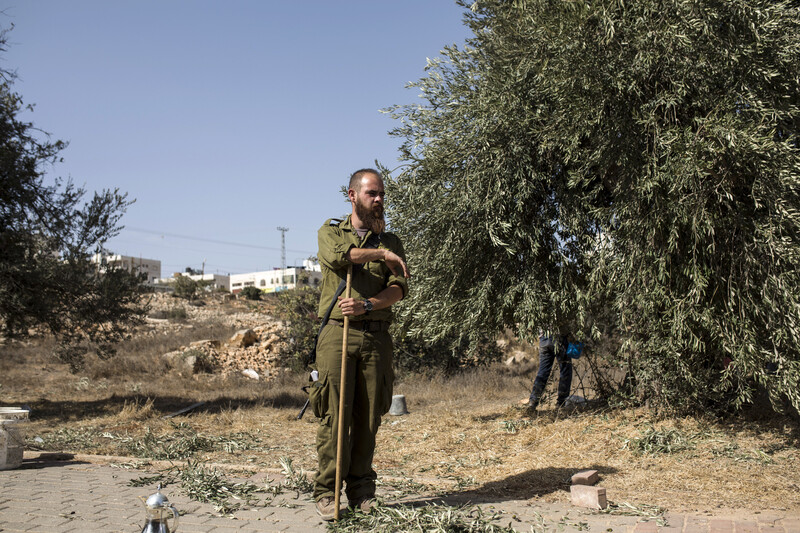
An Israeli soldier stands in front of a tree belonging to the Jabari family in Hebron. Since the family had coordinated with the Israeli military, two soldiers were stationed there the whole day.

An olive branch in Burin, a village near Nablus that is routinely attacked by Israeli settlers, especially during the olive harvest season.
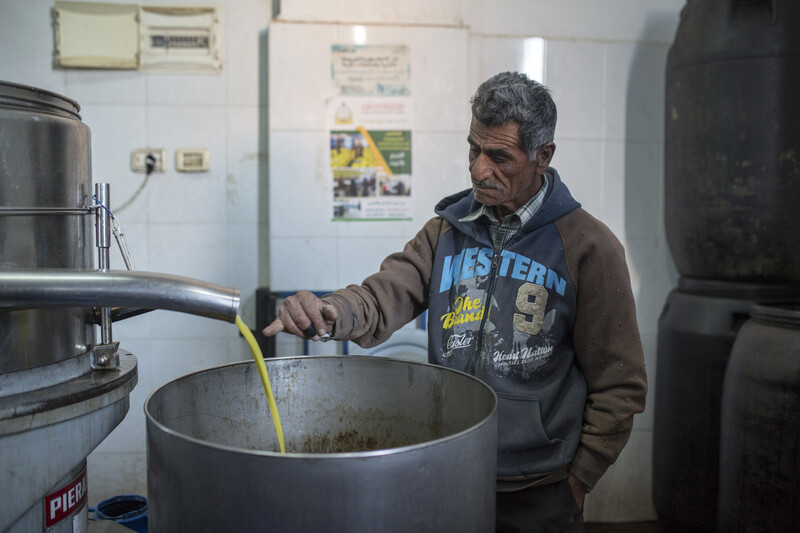
A farmer checks the quality of the olives in a Burin olive press. Good harvests and poor ones tend to alternate and 2018 was not a bumper year for olives.

